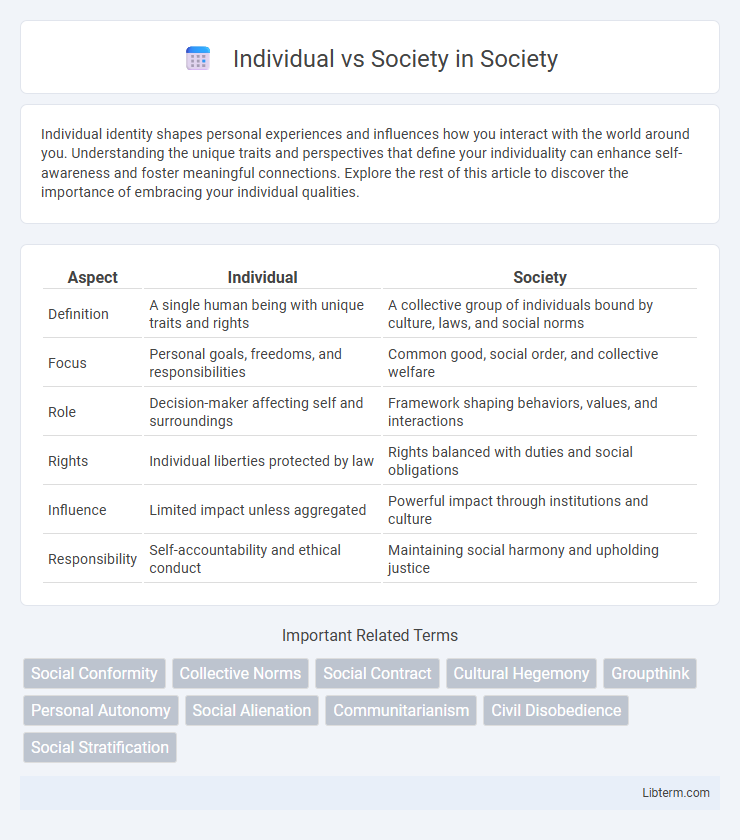Individual identity shapes personal experiences and influences how you interact with the world around you. Understanding the unique traits and perspectives that define your individuality can enhance self-awareness and foster meaningful connections. Explore the rest of this article to discover the importance of embracing your individual qualities.
Table of Comparison
| Aspect | Individual | Society |
|---|---|---|
| Definition | A single human being with unique traits and rights | A collective group of individuals bound by culture, laws, and social norms |
| Focus | Personal goals, freedoms, and responsibilities | Common good, social order, and collective welfare |
| Role | Decision-maker affecting self and surroundings | Framework shaping behaviors, values, and interactions |
| Rights | Individual liberties protected by law | Rights balanced with duties and social obligations |
| Influence | Limited impact unless aggregated | Powerful impact through institutions and culture |
| Responsibility | Self-accountability and ethical conduct | Maintaining social harmony and upholding justice |
Understanding the Individual-Society Dynamic
The dynamic between individual and society involves a complex interplay where personal freedoms are balanced against social norms and collective responsibilities. Understanding this relationship requires analyzing how individual actions impact community welfare and how societal structures shape personal identities and behaviors. Social institutions, cultural values, and legal frameworks collectively influence the negotiation between autonomy and conformity in different contexts.
The Role of Individuality in Social Structures
Individuality shapes social structures by introducing diverse perspectives and unique contributions that drive innovation and cultural evolution. Social systems rely on balancing personal freedoms with collective norms to maintain cohesion while fostering personal growth. The dynamic interplay between individual identity and societal expectations continuously redefines social roles and institutional frameworks.
Society’s Influence on Personal Identity
Society plays a crucial role in shaping personal identity by influencing values, beliefs, and behaviors through cultural norms and social expectations. Social institutions such as family, education, and media contribute to the development of self-concept and social roles, reinforcing collective identity. The interplay between individual experiences and societal pressures often leads to a dynamic negotiation of personal and group identities.
The Balance Between Personal Freedom and Social Norms
Personal freedom represents the right to act according to one's own beliefs and desires, while social norms function as collective standards essential for maintaining order and cohesion within communities. Achieving a balance between these forces requires respecting individual autonomy without compromising the shared values and responsibilities that sustain societal harmony. Excessive emphasis on personal freedom can undermine social stability, whereas rigid conformity to social norms may suppress creativity and self-expression.
Conflict and Cooperation: Individual Interests vs. Collective Goals
Conflict between individual interests and collective goals often arises when personal freedoms challenge societal norms or resource distribution, creating tension within communities. Cooperation emerges through negotiation, compromise, and shared values that align individual aspirations with social welfare, fostering stability and mutual benefit. Balancing these dynamics requires recognizing diverse perspectives while committing to common objectives that sustain social cohesion.
The Impact of Culture on Individual Expression
Culture profoundly shapes individual expression by providing the symbols, language, and norms through which people communicate identity and emotions. It influences personal values and behaviors, often dictating acceptable forms of self-expression while simultaneously enabling unique variations within shared cultural frameworks. Tensions arise when individual desires for authenticity conflict with societal expectations rooted in cultural traditions, highlighting the dynamic interplay between individuality and collective norms.
Social Responsibility: Where Do Individual Duties Lie?
Individual duties in social responsibility primarily emphasize ethical behavior, contributing positively to community welfare, and respecting societal norms to foster collective well-being. Balancing personal freedoms with obligations to others ensures social harmony and promotes sustainable development within society. Embracing responsibilities such as environmental stewardship, civic engagement, and equitable treatment of others reinforces the interconnectedness between individual actions and societal outcomes.
Historical Perspectives on Individual and Society
Historical perspectives on individual and society reveal evolving views on personal autonomy versus collective responsibility. Enlightenment thinkers like John Locke emphasized individual rights and liberty as foundational to social contracts, while sociologists such as Emile Durkheim underscored the importance of social cohesion and norms in maintaining societal order. These differing frameworks highlight the ongoing tension between prioritizing individual freedoms and reinforcing societal structures throughout history.
Modern Challenges: Technology, Individualism, and Community
Modern challenges in the interaction between individual and society are shaped by rapid technological advancements that redefine privacy, identity, and social connections. The rise of individualism intensifies personal autonomy and self-expression, often conflicting with collective norms and community values. Digital platforms both fragment communities and create novel spaces for social cohesion, requiring careful balance between personal freedom and societal responsibility.
Striking Harmony: Finding Equilibrium Between Self and Society
Striking harmony between individual and society requires balancing personal freedom with collective responsibility, ensuring personal goals align with societal values. This equilibrium fosters social cohesion while allowing individuals to express their unique identities and aspirations. Achieving this balance promotes mutual respect, cooperation, and sustainable progress within diverse communities.
Individual Infographic

 libterm.com
libterm.com